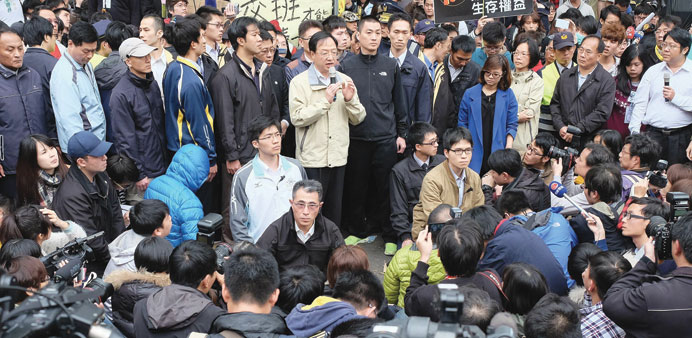AFP, DPA/Taipei
Taiwan’s Prime Minister Jiang Yi-huah said yesterday the government will not withdraw a contentious trade pact with China, rejecting calls from protesters occupying parliament to stop its ratification.
In the first direct dialogue between the government and protesters, Jiang walked to the parliament building surrounded by bodyguards as some protesters jostled and shouted “step down” in footage broadcast live on local television.
“The cabinet sent the service trade pact to parliament because we think it will help Taiwan’s liberalisation and internationalisation. We do not plan to withdraw (it),” Jiang told the crowd gathered on the streets outside.
Jiang added that he would however support a thorough article-by-article review of the pact by parliament, as some protesters shouted “send back the pact”.
The agreement is designed to open up further trade in services between China and Taiwan, which split 65 years ago after a civil war.
But the protesters say the deal will damage Taiwan’s economy and leave it vulnerable to political pressure from China, allegations rejected by President Ma Ying-jeou’s ruling Kuomintang party, which warns that failure to ratify the agreement would be a grave setback in Taiwan’s efforts to seek more free trade agreements.
First signed in July, protesters have demanded Ma “return” the service trade pact to China, rejecting the government’s bid to push ahead with plans to ratify it.
More than 200 student protesters stormed the parliament’s main chamber on Tuesday and have remained there ever since, the first such occupation of the building in Taiwan’s history.
Hundreds of police attempted to barge their way in and end the occupation hours after it began, but they failed to breach the improvised barricades fashioned by the students out of piles of armchairs.
The activists vowed to continue their action following the premier’s remarks yesterday.
“We have insisted for five days that the students inside the chamber and those outside let us continue and invite more friends to join us,” student leader Lin Fei-fen told the crowd after interrupting Jiang and asking him to leave the protest scene.
The pact passed its first parliamentary hurdle last Monday after it was approved by a committee, but the opposition insisted the approval was illegal.
The deal is a follow-up agreement to a sweeping Economic Cooperation Framework Agreement signed in 2010 to reduce trade barriers between China and Taiwan.
Ma has overseen a marked thaw in relations with Beijing since he came to power in 2008, pledging to strengthen trade and tourism links.
But China still considers Taiwan as part of its territory awaiting reunification - by force if necessary.
Jiang later told a news conference that occupying the legislative chamber failed to show respect for democracy, urging the students to leave as soon as possible.
Media say that at peak times this week, more than 30,000 protesters, including students and trade unionists, were demonstrating outside the legislative building.
The critics charge that China will get too much influence on Taiwan’s economy if the pact is adopted. Labour union leaders have also cast doubt on the pact, worrying that the opening of markets will result in local unemployment.
“I’ll be a worker in the future. I’m afraid that the pact with China will deprive me of job opportunities,” Huang Yi-hau, a 17-year-old protester from an agricultural tech school in southern Taiwan, told DPA.
Local offices of the ruling party in several cities and counties were surrounded yesterday by thousands of protesters upset at the way the legislature has dealt with the pact.

Taiwan Premier Jiang Yi-huah speaks to protesting students outside the parliament in Taipei.
